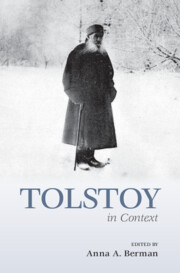Book contents
- Tolstoy in Context
- Tolstoy in Context
- Copyright page
- Contents
- Figures
- Notes on Contributors
- Preface
- Acknowledgments
- Note on Citations, Translations, and Transliterations
- Chronology
- Part I The Man
- Part II Russian Social and Political Contexts
- Part III Literature, the Arts, and Intellectual Life
- Chapter 16 Tolstoy’s Oeuvre
- Chapter 17 Peasant Schools and Education
- Chapter 18 Russian Philosophy
- Chapter 19 The Russian Literary Scene
- Chapter 20 European Literature
- Chapter 21 European Philosophy
- Chapter 22 Theater
- Chapter 23 Music
- Chapter 24 The Visual Arts
- Part IV Science and Technology
- Part V Beyond Russia
- Part VI Tolstoy’s Afterlife
- Suggested Further Reading
- Index
Chapter 18 - Russian Philosophy
from Part III - Literature, the Arts, and Intellectual Life
Published online by Cambridge University Press: 05 January 2023
- Tolstoy in Context
- Tolstoy in Context
- Copyright page
- Contents
- Figures
- Notes on Contributors
- Preface
- Acknowledgments
- Note on Citations, Translations, and Transliterations
- Chronology
- Part I The Man
- Part II Russian Social and Political Contexts
- Part III Literature, the Arts, and Intellectual Life
- Chapter 16 Tolstoy’s Oeuvre
- Chapter 17 Peasant Schools and Education
- Chapter 18 Russian Philosophy
- Chapter 19 The Russian Literary Scene
- Chapter 20 European Literature
- Chapter 21 European Philosophy
- Chapter 22 Theater
- Chapter 23 Music
- Chapter 24 The Visual Arts
- Part IV Science and Technology
- Part V Beyond Russia
- Part VI Tolstoy’s Afterlife
- Suggested Further Reading
- Index
Summary
Russian philosophy was an important context for the development of Tolstoy’s thought and was also decisively shaped by it, especially after his religious conversion. In A Confession (1882), Tolstoy explained the process and inner dynamics of his newfound faith: how he eventually became convinced that the ideals that had driven his lifelong efforts at self-perfection and moral perfectibility entailed a higher divine reality. This idealist conception of faith had much in common with Kant’s moral theology and was a powerful stimulus to the further development of Russian philosophy, culminating in the so-called Russian religious-philosophical renaissance of the early twentieth century. The first part of this chapter focuses on Russian philosophy after 1880, when Tolstoy’s influence was greatest. The second part turns to developments earlier in the century, showing how Russian philosophy, especially the famous Slavophile–Westernizer controversy of the 1840s and the subsequent development of Slavophile religious thought, formed the context for Tolstoy’s thinking on the three problems that most preoccupied him: human dignity, the meaning of progress, and the foundations of faith.
Keywords
- Type
- Chapter
- Information
- Tolstoy in Context , pp. 144 - 152Publisher: Cambridge University PressPrint publication year: 2022



